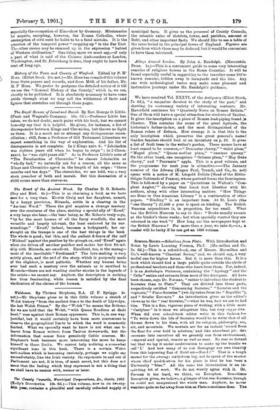We have received Vol. XXXVI. of the Antiquary (Elliot Stock,
7s. 6d.), "a magazine devoted to the study of the past," and showing its customary variety of interesting contents. Mr. Haver6eld continues his " Quarterly Notes on Roman Britain." One of them will have a special attraction for students of Tacitus. It gives the inscription on a piece of Roman lead-piping found ,:e1 Chester. This contains the name of the great Agricola, the historian's father-in-law, and the most distinguished of the Roman rulers of Britain. How strange it is that this is the only inscription which preserves the great general's name! Garden fanciers should look at an inventory on p. 62. It gives a list of fruit trees in the writer's garden. These names have at least ceased to be common,—" Doncaster cherry," " violet plum," " Mogul plum," " Queen-mother plum," " summer queeny." On the other hand, one recognises " Orleans plum," " May Duke cherry," and " Peartnain" apple. This is a good volume, and the programme for next year is attractive.—The January number of the Library (Kegan Paul, Trench, and Co., 3s. net) opens with a notice of M. Leopold Delisle (Head of the Biblio- thhque Nationale of France), whose portrait forms the frontispiece. This is followed by a paper on "Quotations in Walton's Com- pleat Angler," showing that Izaak took liberties with his authors, along with other interesting matters. " How Things are Done in One American Library" is a continuation of other papers. " Binding" is an important item. At St. Louis (the "one library") £1,000 a year is spent on binding. The British Museum expenditure is, in proportion, far too small. What has the British Museum to say to this: " Books usually remain at the binder's three weeks ; but when specially wanted they are returned in one week "? How long are the newspapers kept at the British Museum ? For more than a year, we take it,---i.e, a reader will be lucky if he can get an 1898 volume.


































 Previous page
Previous page